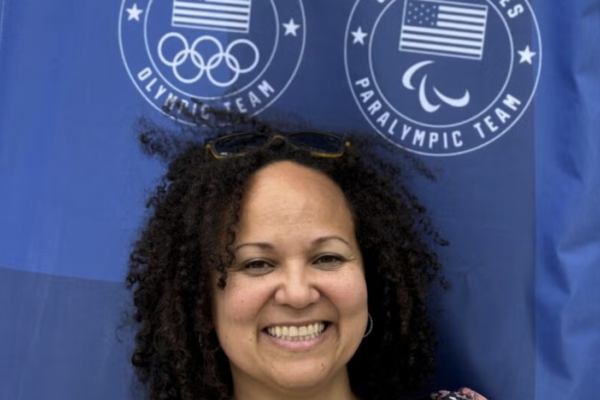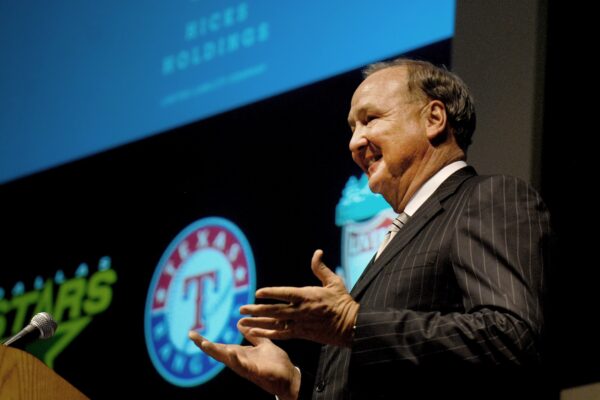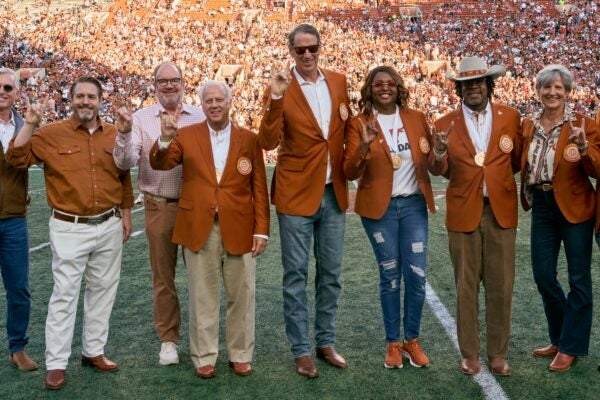Organic Ascent
Carla Vernón takes charge of General Mills’ natural foods portfolio and boosts the company’s efforts to move beyond sustainability
By Judie Kinonen

Soil isn’t a topic that generally incites much passion — unless you’re talking to Carla Vernón, MBA ’98, president of the natural and organic business at General Mills. “I just can’t stop talking about it,” Vernón says. “We’re setting the standard for how big food companies can actually leave the land better than we found it.” It’s a lofty goal, growing more attainable all the time for Vernón, who manages the second-largest branded portfolio of organic food in the country. Her business includes such household names as Cascadian Farm, Immaculate Baking, Muir Glen, Austin-based Epic Provisions, and General Mills’ largest natural and organic food brand, Annie’s Homegrown. Retail sales for Annie’s increased 40 percent in 2017.
Vernón, who received a bachelor’s degree in ecology and evolutionary biology from Princeton before she came to McCombs, is still pinching herself at the way education, career, and life-long passion have finally coalesced into what she calls “hashtag dream job.”
Persistence and Humility
But Vernón insists her story is not one of overnight success. She started at General Mills in 1998 as an associate marketing manager in its snacks division and, most recently, served as vice president of natural and organic growth acceleration.
“It was not quick,” she says. “I am so proud that it looks like it was all a smooth path and success was inevitable, but that is not really how it goes in careers. I had a lot of stumbles and missteps along the way.”
Yet now, after 20 years with General Mills, Vernón believes she can truly make the kind of difference in the world that she dreamed of when she was a student.
“A brand is not a logo; a brand is a promise,” Vernón says. “We have a stated relationship with the people who buy our food. They expect us to be good stewards of the ingredients. They also expect us to use practices that aren’t simply neutral or non-detrimental — but that are proactively positive for the planet.”
At the heart of Vernón’s mission as president of General Mills’ natural and organic business is an emerging conversation about a form of agriculture that moves beyond sustainable agricultural practices that protect the environment to regenerative ones that actually reverse atmospheric carbon accumulation.
“The regenerative agriculture movement addresses the fact that these soils have become such monocultures that they are practically deserts,” she says. The standard practice is to apply chemical fertilizers to the soil before crops can be planted, but, says Vernón, “it doesn’t have to be that way.”
This form of agriculture that is gaining adoption, Vernón explains, focuses on practices including cover crops and establishing pollinator habitats, with a goal “to foster a diverse macro and micro ecosystem, so that the soil restores itself back to earth.”
Vernón says soil is only part of the story. “Agriculture is one of the most important drivers of climate and climate change. The ability to improve the amount of carbon that is sequestered in the soil is one of the most direct and large-scale actions that can be taken by any industry to help reduce global greenhouse gas emissions.”
As a Fortune 500 company with billion dollar brands, a global supply chain, and millions of acres of land, General Mills has committed to reducing these emissions by 28 percent within their chain by the year 2025.
Unfamiliar Territory
Accomplishing such a goal will be no small feat, but Vernón says she is humbled at the opportunity. “I have never been ashamed of the fact that I don’t know certain topics, but I am willing to study and learn and find mentors,” she says. “If I know there’s a particular aspect of running a business that I’m not too good at, then I will assign myself the task of improving.”
Vernón recalls a daunting situation years ago. She was running General Mills’ snack bars business, and she had identified the need for a category analysis and leadership strategy for the company’s sales teams. “Even though I had no experience pulling this sort of material together from a sales and retailer perspective, the project was my responsibility,” she says. She set to work finding sales people who could coach, collaborate, and help her push forward on the project.
“In the beginning it was uncomfortable,” Vernón says. “But, today, it is an experience that allows me to coach others to find their courage and tenacity for unfamiliar areas.”
“I call it the process of eating my vegetables,” she says, laughing. “I think one of the things that enabled me to be successful in the long run was a tenacity to improve myself.”
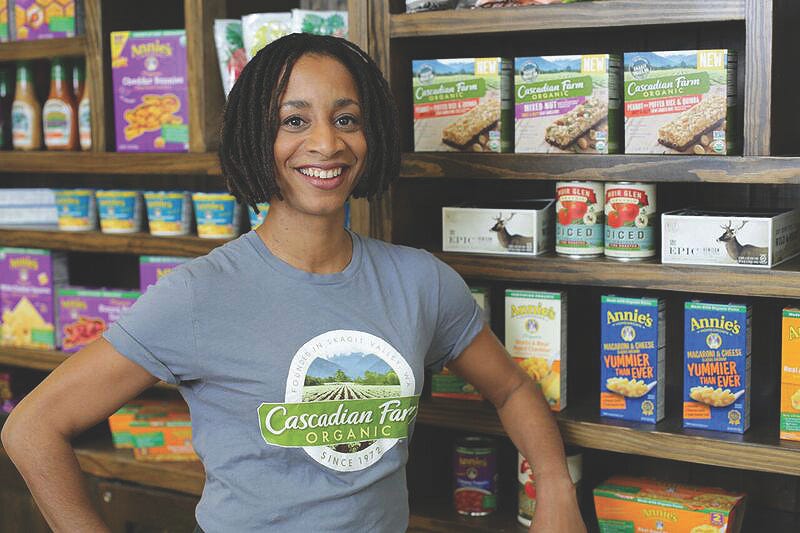
A Heritage of Achievement
Vernón comes by this kind of resolve honestly. Her father emigrated from Panama to segregated New Orleans in 1958, a bleak era for civil rights in the United States. He met Vernón’s mother, a New Orleans native, while they were both students at Xavier University.
“They really believed in education, like so many immigrants and people coming from communities that are disadvantaged or socially oppressed,” she says. “They believed that education was an important tool in moving up.”
Vernón’s mother earned undergraduate degrees in math, education, and — as Vernón only recently learned — physics. She went on to work for NASA, in a segregated workplace much like the one portrayed in the 2016 film Hidden Figures. The pursuit of master’s degrees finally landed her and her husband in Buffalo, New York, where they both earned doctoral degrees while working and raising Vernón and her brother.
Their achievements make sense, given their background, Vernón says. “Opportunities were still not made fully available to African Americans and Latinos in the United States,” Vernón says. “And as we as a people have often been taught, we need to be more than qualified and demonstrate above and beyond measure that we’re capable of opportunity when opportunity comes our way.”
Her mother went on to become a high school math and science teacher and her father a math professor and administrator for the State University of New York system. Vernón says her parents imparted an important lesson to their children: “We were taught, ‘Hey, the world is not always going to treat you kindly — whether you are a black person, an immigrant, a woman — and we have to do different than that. We have to make sure we do treat others with kindness and respect and dignity,’” she says. “That was always one of my family’s key values.”
Divided Energies
Those values figured prominently in Vernón’s own educational path as an undergraduate at Princeton. In the ’70s and ’80s, the media focus on pollution and the general message that the planet was in trouble made a lasting impression on Vernón. “Even as a teenager, I had this thought in the back of my head, ‘Is it even ethical for me to have children? Is it ethical to bring another generation that would then beget more generations onto a planet that seemed to be in a state of decline?’ That’s something that weighed on my mind.”
With that acute social consciousness — and her parents’ urging toward some kind of science degree — Vernón threw herself into the study of ecology, not knowing then what career path the degree might lead to. “I can’t say that I was the college student with much of a plan,” she says.
Her first job out of college was a one-year fellowship sponsored by Princeton alumni at the Nature Conservancy, a global nonprofit organization promoting stewardship of land and native species. Then came a historic opportunity to work for Carol Moseley Braun, the first African-American woman elected to the U.S. Senate. “That job opened my eyes,” Vernón says. “I saw a bigger world just by seeing how policy and politics work.”
That job led to another nonprofit in Chicago, and over time Vernón’s perception of what it means “to be of service” began to shift. “I thought that the best place to do service work would be in the service sector — nonprofit, or government,” she says, but she became acutely aware of some real obstacles there.
“I learned that they very much have to divide their energy and time between doing their mission and raising enough money to deliver their mission,” Vernón says.
At the same time, she was meeting with a mentorship group of prominent Princeton alumni from the class of 1955 who taught her that the nonprofit sector was not the only way to have the kind of impact she hoped to have.
“They taught me that, in fact, there are places — like business — where you might have more resources and maybe more position power to do good with the tools at your disposal,” she says.
Lean Times
Just as it dawned on Vernón that service might be better accomplished through business, a more practical consideration also loomed on the horizon: “My student loans came due,” she says. “The nonprofit sector was not a very profitable sector for me personally, and I was really, really struggling to repay my student loans.”
When she learned how an MBA could redirect a career path “from something that wasn’t business toward business,” she applied for a fellowship program — the Consortium for Graduate Study in Management — designed to help companies find a more diverse pool of candidates for their employee base.
On her fellowship application, Vernón listed UT as one of her top choices, having fallen in love with Austin years before while visiting a friend who was doing post-graduate work at the university. “Keep in mind, I was living in Chicago at the time, so it didn’t hurt that Austin was very warm,” she says.
“The month before I left Chicago, I had a massive garage sale and sold almost all of my worldly possessions in order to make a little bit of pocket change so that I had enough to go to Texas and get started,” she recalls. “They were lean times, but even in lean times, Austin is an amazing place to be.”
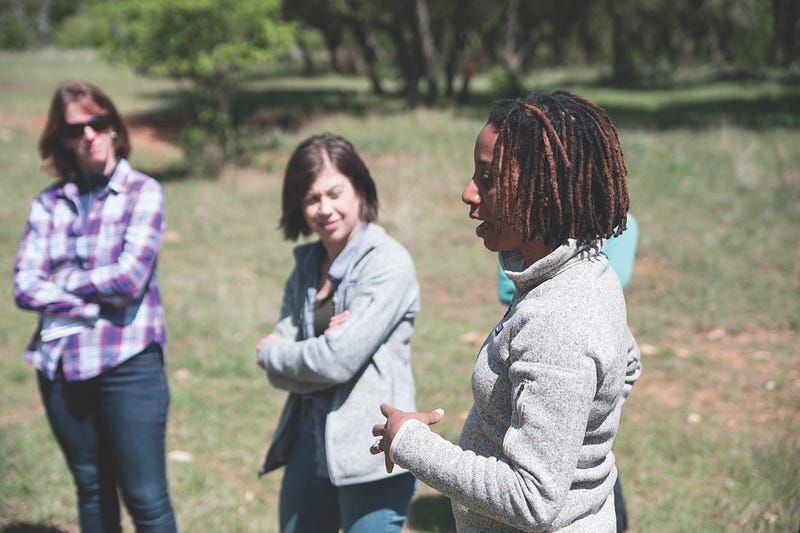
Soaking it In
Vernón describes herself in business school as “an absolute sponge.” The coursework itself — specifically her classes on negotiation and operations — provided “a new frame of thinking,” and supplied “tools that, to this day, still help me understand concepts and circumstances in business.”
Even beyond the coursework, “the learning is equally with the people you meet and the teams you work on,” Vernón says. “That was rich.”
By her second semester at McCombs, she understood that her talents and interests were in marrying strategic thinking with creative problem solving, and that marketing — a field she had scarcely heard of before — might be her life’s calling.
She recalls marching wide-eyed and eager into her first career fair during business school, clutching a resume printed on extra thick paper, exploring the booths with a palpable curiosity. “I was like a country bumpkin,” she says.
When the chance came to interview with General Mills, she sensed the fit right away. “They were authentic people with unique personalities, and with energy that just came at you in the room. I felt it was the kind of company that wanted you to be your unique self,” she says. “And I knew that I could pretty much only be my unique self.”
#DreamJob
Now, after two decades with General Mills, it’s clear how being her unique self has brought Vernón to her current position, where her lifelong mission to help the planet is actually within reach.
“What is it that Arthur Ashe said? ‘Start where you are, use what you have, do what you can,’” she quotes. “I’m just trying to put myself in a position to really put the things at my fingertips to good use.”
Vernón splits her time between her Berkeley office and her home in Minneapolis, where she lives with her husband, Jason Bowles, MBA ’98, whom she met at UT, their two children — 12-year-old Jay and 10-year-old Charley — and her mother. She says when she announced her promotion to president of the division that oversees Annie’s Organics last year, her children screamed with excitement.
“It’s exciting for anybody, especially children, to know that maybe we’re not leaving them a planet that’s worse than we found it,” Vernón says.
“I owe it to my children, I owe it to yours, and I want to do what I can.”
This article appeared in the fall 2018 issue of McCombs magazine. Click on the link to see the full issue.
About this Post
Share:
